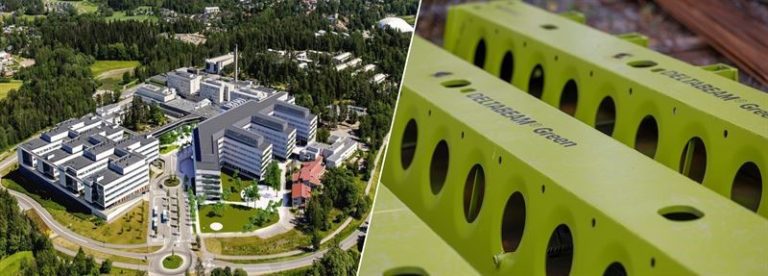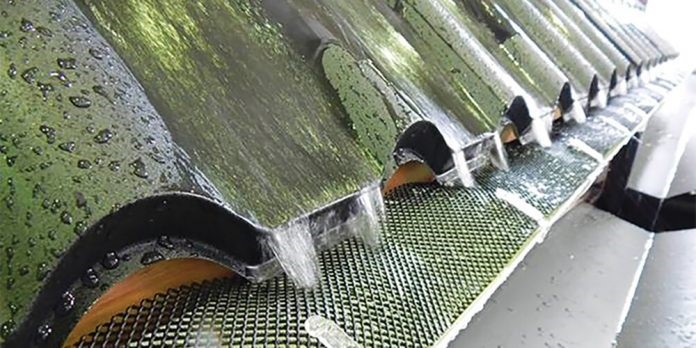CONTRACTORS OFTEN get calls from property owners and managers who mistakenly think the roof is leaking. Many leaks are the result of a gutter block, often caused by leaves from overhanging trees or moss growth on the roof. This leads to gutters regularly overflowing causing damage to buildings. When gutter brush systems first came on the market, contractors thought they had found a simple, cost-effective solution to offer clients. New builds began to incorporate gutter brushes at the time of construction to counter known risks, for example from trees which had to be retained to gain planning for the development. Contractors thought their problems were solved, until they began to receive angry callbacks. Many returned to find that the gutter brush or infill systems they’d installed were impeding rainwater flow, in itself causing overflows, or the systems were accumulating debris and getting blocked so frequently they’d become more hindrance than help. LiabilityDoug Basen of Local Authority Building Control highlighted the problem when he cautioned inspectors to advise clients to choose anti-blocking gutter systems carefully. Citing Building Regulations part H3, and BS EN 12056-3:2000 Clause 7.3.3, which states “the reduction in outlet capacity due to strainers being installed shall be taken into consideration”, Doug warned that installers might find themselves liable if they had fitted a product which ultimately caused building damage. Doug compared the various products on offer, assessing rainwater flow rates when they’re installed. Foam, fibre, rubber or acrylic systems are designed to sit in the gutter and absorb water moving it to a downpipe without allowing any material to find its way into the system. Three products were examined: firstly, foam, fibre, rubber or acrylic systems designed to sit in the gutter and absorb water moving it to a downpipe without allowing any material to find its way into the system. Secondly, gutter brushes were evaluated: also designed to sit in the gutter and catch debris while still permitting waterflow. Thirdly, gutter guards, which are a mesh fitted to the open top of the gutter. Reduction in flow capacityAfter conducting his investigation Doug concluded: “It would seem the first two examples will immediately cause a reduction in flow capacity as a direct result of their installation. The moral here is make sure you do check if guttering anti-blockage has been incorporated before completion, and, if it has, that the flow rate of the gutter has not been impeded. Mesh gutter guards are the clear winner here because, sitting on the top of the gutter, they clearly don’t impede water flow.” Not all equalBut, not all gutter guard meshes are created equal. For example, a mesh construction allowing for a slope is vital: flat gutter guards do not perform optimally. If the gutter mesh is not sloped towards the outer edge of the gutter where it’s fitted, it risks leaves still accumulating on the mesh surface where they will start to decompose and form a mulch, over which rainwater can run off. Whereas a sloped mesh will help debris to sluice harmlessly of the mesh surface, while rainwater is channelled away. Tests conducted by the Building Research Establishment (BRE) to the principle of BS EN 12056-3-2000 confirm these findings. BRE tests showed that, firstly, any product that sits within the gutter can impede rainwater flow by as much as 50-80%. CONTRACTORS OFTEN get calls from property owners and managers who mistakenly think the roof is leaking. Many leaks are the result of a gutter block, often caused by leaves from overhanging trees or moss growth on the roof. This leads to gutters regularly overflowing causing damage to buildings. When gutter brush systems first came on the market, contractors thought they had found a simple, cost-effective solution to offer clients. New builds began to incorporate gutter brushes at the time of construction to counter known risks, for example from trees which had to be retained to gain planning for the development. Contractors thought their problems were solved, until they began to receive angry callbacks. Many returned to find that the gutter brush or infill systems they’d installed were impeding rainwater flow, in itself causing overflows, or the systems were accumulating debris and getting blocked so frequently they’d become more hindrance than help. LiabilityDoug Basen of Local Authority Building Control highlighted the problem when he cautioned inspectors to advise clients to choose anti-blocking gutter systems carefully. Citing Building Regulations part H3, and BS EN 12056-3:2000 Clause 7.3.3, which states “the reduction in outlet capacity due to strainers being installed shall be taken into consideration”, Doug warned that installers might find themselves liable if they had fitted a product which ultimately caused building damage. Doug compared the various products on offer, assessing rainwater flow rates when they’re installed. Foam, fibre, rubber or acrylic systems are designed to sit in the gutter and absorb water moving it to a downpipe without allowing any material to find its way into the system. Three products were examined: firstly, foam, fibre, rubber or acrylic systems designed to sit in the gutter and absorb water moving it to a downpipe without allowing any material to find its way into the system. Secondly, gutter brushes were evaluated: also designed to sit in the gutter and catch debris while still permitting waterflow. Thirdly, gutter guards, which are a mesh fitted to the open top of the gutter. Reduction in flow capacityAfter conducting his investigation Doug concluded: “It would seem the first two examples will immediately cause a reduction in flow capacity as a direct result of their installation. The moral here is make sure you do check if guttering anti-blockage has been incorporated before completion, and, if it has, that the flow rate of the gutter has not been impeded. Mesh gutter guards are the clear winner here because, sitting on the top of the gutter, they clearly don’t impede water flow.” Not all equalBut, not all gutter guard meshes are created equal. For example, a mesh construction allowing for a slope is vital: flat gutter guards do














